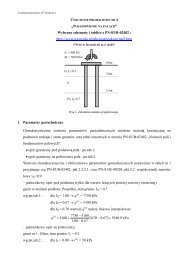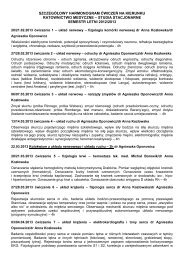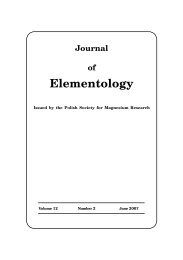- Page 4:
4 Spis treœciStanis³aw Sagan, Vik
- Page 8 and 9:
8 Piotr Majerwsta³¹ na mocy decyz
- Page 10 and 11:
10 Piotr Majerwych prowadzi³o wyk
- Page 12 and 13:
12 Piotr MajerZadanie, jakie otrzym
- Page 14 and 15:
14 Piotr Majero nadanie tytu³u pro
- Page 16 and 17:
16 Piotr Majer2005-2008 wprowadzi³
- Page 18 and 19:
18 Piotr MajerStudenci studiów sta
- Page 20 and 21:
20 Piotr Majerz organizacj¹ konfer
- Page 22 and 23:
22 Piotr Majerorganizacyjnych. Z ch
- Page 24 and 25:
24 Piotr Majerhab. S. Pikulskiego d
- Page 27 and 28:
Geneza i pierwsza dekada dzia³alno
- Page 29 and 30:
Geneza i pierwsza dekada dzia³alno
- Page 31 and 32:
UWM2011Studia Prawnoustrojowe 1331G
- Page 33 and 34:
La Facoltà di Diritto e Amministra
- Page 35 and 36:
La Facoltà di Diritto e Amministra
- Page 37 and 38:
UWM2011Studia Prawnoustrojowe 1337G
- Page 39 and 40:
Dieci anni della Facoltà: un impeg
- Page 41 and 42:
Dieci anni della Facoltà: un impeg
- Page 43:
Dieci anni della Facoltà: un impeg
- Page 47 and 48:
UWM2011Studia Prawnoustrojowe 1347M
- Page 49 and 50:
Arendtowska recepcja filozofii mora
- Page 51 and 52:
Arendtowska recepcja filozofii mora
- Page 53 and 54:
Arendtowska recepcja filozofii mora
- Page 55 and 56:
Arendtowska recepcja filozofii mora
- Page 57 and 58:
Arendtowska recepcja filozofii mora
- Page 59:
Arendtowska recepcja filozofii mora
- Page 62 and 63:
62 Jaime Bonet NavarroEl carácter
- Page 64 and 65:
64 Jaime Bonet Navarro2.1.1. El der
- Page 66 and 67:
66 Jaime Bonet Navarrolibertad reli
- Page 68 and 69:
68 Jaime Bonet Navarro3. La Ley de
- Page 70 and 71:
70 Jaime Bonet Navarrode sus líder
- Page 72 and 73:
72 Jaime Bonet Navarrouna legislaci
- Page 75 and 76:
UWM2011Studia Prawnoustrojowe 1375B
- Page 77 and 78:
Reforma Trybuna³ów Podatkowych w
- Page 79 and 80:
Reforma Trybuna³ów Podatkowych w
- Page 81 and 82:
Reforma Trybuna³ów Podatkowych w
- Page 83 and 84:
UWM2011Studia Prawnoustrojowe 1383D
- Page 85 and 86:
Interes prawny jako podstawa legity
- Page 87 and 88:
Interes prawny jako podstawa legity
- Page 89 and 90:
Interes prawny jako podstawa legity
- Page 91 and 92:
UWM2011Studia Prawnoustrojowe 1391B
- Page 93 and 94:
Obowi¹zywanie aktu administracyjne
- Page 95 and 96:
Obowi¹zywanie aktu administracyjne
- Page 97 and 98:
Obowi¹zywanie aktu administracyjne
- Page 99 and 100:
Obowi¹zywanie aktu administracyjne
- Page 101 and 102:
Obowi¹zywanie aktu administracyjne
- Page 103 and 104:
Obowi¹zywanie aktu administracyjne
- Page 105 and 106:
Obowi¹zywanie aktu administracyjne
- Page 107 and 108:
Obowi¹zywanie aktu administracyjne
- Page 109 and 110:
UWM2011Studia Prawnoustrojowe 13109
- Page 111 and 112:
W kwestii argumentacyjnego stosowan
- Page 113 and 114:
W kwestii argumentacyjnego stosowan
- Page 115 and 116:
W kwestii argumentacyjnego stosowan
- Page 117 and 118:
W kwestii argumentacyjnego stosowan
- Page 119 and 120:
W kwestii argumentacyjnego stosowan
- Page 121 and 122:
W kwestii argumentacyjnego stosowan
- Page 123 and 124:
W kwestii argumentacyjnego stosowan
- Page 125 and 126:
UWM2011Studia Prawnoustrojowe 13125
- Page 127 and 128:
Unia Europejska jako definiendum127
- Page 129 and 130:
Unia Europejska jako definiendum129
- Page 131 and 132:
Unia Europejska jako definiendum131
- Page 133 and 134:
Unia Europejska jako definiendum133
- Page 135 and 136:
UWM2011Studia Prawnoustrojowe 13135
- Page 137 and 138:
„Czasowe odebranie” oraz „prz
- Page 139 and 140:
„Czasowe odebranie” oraz „prz
- Page 141 and 142:
„Czasowe odebranie” oraz „prz
- Page 143 and 144:
„Czasowe odebranie” oraz „prz
- Page 145 and 146:
„Czasowe odebranie” oraz „prz
- Page 147 and 148:
„Czasowe odebranie” oraz „prz
- Page 149 and 150:
UWM2011Studia Prawnoustrojowe 13149
- Page 151 and 152:
Walka z terroryzmem z perspektywy p
- Page 153 and 154:
Walka z terroryzmem z perspektywy p
- Page 155 and 156:
Walka z terroryzmem z perspektywy p
- Page 157 and 158:
Walka z terroryzmem z perspektywy p
- Page 159 and 160:
Walka z terroryzmem z perspektywy p
- Page 161 and 162:
Walka z terroryzmem z perspektywy p
- Page 163 and 164:
Walka z terroryzmem z perspektywy p
- Page 165 and 166:
Walka z terroryzmem z perspektywy p
- Page 167 and 168:
Walka z terroryzmem z perspektywy p
- Page 169 and 170:
Walka z terroryzmem z perspektywy p
- Page 171 and 172:
Walka z terroryzmem z perspektywy p
- Page 173 and 174:
Walka z terroryzmem z perspektywy p
- Page 175 and 176:
Walka z terroryzmem z perspektywy p
- Page 177 and 178:
Walka z terroryzmem z perspektywy p
- Page 179 and 180:
Walka z terroryzmem z perspektywy p
- Page 181 and 182:
UWM2011Studia Prawnoustrojowe 13181
- Page 183 and 184:
La innecesaria incapacitación judi
- Page 185 and 186:
La innecesaria incapacitación judi
- Page 187 and 188:
La innecesaria incapacitación judi
- Page 189 and 190:
La innecesaria incapacitación judi
- Page 191 and 192:
La innecesaria incapacitación judi
- Page 193 and 194:
La innecesaria incapacitación judi
- Page 195 and 196:
UWM2011Studia Prawnoustrojowe 13195
- Page 197 and 198:
Jaka Policja - uwagi na marginesie
- Page 199 and 200:
Jaka Policja - uwagi na marginesie
- Page 201 and 202:
Jaka Policja - uwagi na marginesie
- Page 203 and 204:
Jaka Policja - uwagi na marginesie
- Page 205 and 206:
Jaka Policja - uwagi na marginesie
- Page 207 and 208:
Jaka Policja - uwagi na marginesie
- Page 209 and 210:
Jaka Policja - uwagi na marginesie
- Page 211 and 212:
Jaka Policja - uwagi na marginesie
- Page 213 and 214:
UWM2011Studia Prawnoustrojowe 13213
- Page 215 and 216:
Donna e società. Spose e Madri a R
- Page 217 and 218:
Donna e società. Spose e Madri a R
- Page 219 and 220:
Donna e società. Spose e Madri a R
- Page 221 and 222:
Donna e società. Spose e Madri a R
- Page 223 and 224:
UWM2011Studia Prawnoustrojowe 13223
- Page 225 and 226:
Sprzedajne nadu¿ycie w³adzy koœc
- Page 227 and 228:
Sprzedajne nadu¿ycie w³adzy koœc
- Page 229 and 230:
Sprzedajne nadu¿ycie w³adzy koœc
- Page 231 and 232:
Sprzedajne nadu¿ycie w³adzy koœc
- Page 233 and 234:
UWM2011Studia Prawnoustrojowe 13233
- Page 235 and 236:
Rodzaje stref specjalnych235Ogranic
- Page 237 and 238:
Rodzaje stref specjalnych237przejœ
- Page 239 and 240:
Rodzaje stref specjalnych239- mo¿n
- Page 241 and 242:
Rodzaje stref specjalnych241- dyrek
- Page 243 and 244:
Rodzaje stref specjalnych243IV. Str
- Page 245 and 246:
Rodzaje stref specjalnych245wane. O
- Page 247 and 248:
UWM2011Studia Prawnoustrojowe 13247
- Page 249 and 250:
Kwalifikacja prawa zamachów terror
- Page 251 and 252:
Kwalifikacja prawa zamachów terror
- Page 253 and 254:
Kwalifikacja prawa zamachów terror
- Page 255 and 256:
Kwalifikacja prawa zamachów terror
- Page 257 and 258:
Kwalifikacja prawa zamachów terror
- Page 259 and 260:
Kwalifikacja prawa zamachów terror
- Page 261 and 262:
Kwalifikacja prawa zamachów terror
- Page 263 and 264:
Kwalifikacja prawa zamachów terror
- Page 265 and 266:
UWM2011Studia Prawnoustrojowe 13265
- Page 267 and 268:
Organizacje pozarz¹dowe na tle pro
- Page 269 and 270:
Organizacje pozarz¹dowe na tle pro
- Page 271 and 272:
Organizacje pozarz¹dowe na tle pro
- Page 273 and 274:
Organizacje pozarz¹dowe na tle pro
- Page 275 and 276:
Organizacje pozarz¹dowe na tle pro
- Page 277 and 278:
Organizacje pozarz¹dowe na tle pro
- Page 279 and 280:
Organizacje pozarz¹dowe na tle pro
- Page 281 and 282:
Organizacje pozarz¹dowe na tle pro
- Page 283 and 284:
Organizacje pozarz¹dowe na tle pro
- Page 285 and 286:
Organizacje pozarz¹dowe na tle pro
- Page 287 and 288:
Organizacje pozarz¹dowe na tle pro
- Page 289 and 290:
UWM2011Studia Prawnoustrojowe 13289
- Page 291 and 292:
Kilka uwag o stanie refleksyjnej r
- Page 293 and 294:
Kilka uwag o stanie refleksyjnej r
- Page 295 and 296:
Kilka uwag o stanie refleksyjnej r
- Page 297 and 298:
Kilka uwag o stanie refleksyjnej r
- Page 299 and 300:
Kilka uwag o stanie refleksyjnej r
- Page 301 and 302:
Kilka uwag o stanie refleksyjnej r
- Page 303 and 304:
UWM2011Studia Prawnoustrojowe 13303
- Page 305 and 306:
Pena di morte305morte, tuttavia ass
- Page 307 and 308:
Pena di morte307A fronte di una sos
- Page 309 and 310:
Pena di morte309pena di morte”, p
- Page 311 and 312:
Pena di morte311del sud-est asiatic
- Page 313 and 314:
UWM2011Studia Prawnoustrojowe 13313
- Page 315 and 316:
Politycznokryminalne aspekty stalki
- Page 317 and 318:
Politycznokryminalne aspekty stalki
- Page 319 and 320:
Politycznokryminalne aspekty stalki
- Page 321 and 322:
Politycznokryminalne aspekty stalki
- Page 323 and 324:
Politycznokryminalne aspekty stalki
- Page 325 and 326:
Politycznokryminalne aspekty stalki
- Page 327 and 328:
Politycznokryminalne aspekty stalki
- Page 329 and 330:
Politycznokryminalne aspekty stalki
- Page 331 and 332:
Politycznokryminalne aspekty stalki
- Page 333 and 334: UWM2011Studia Prawnoustrojowe 13333
- Page 335 and 336: Zasada dwuinstancyjnoœci postêpow
- Page 337 and 338: Zasada dwuinstancyjnoœci postêpow
- Page 339 and 340: Zasada dwuinstancyjnoœci postêpow
- Page 341 and 342: Zasada dwuinstancyjnoœci postêpow
- Page 343 and 344: UWM2011Studia Prawnoustrojowe 13343
- Page 345 and 346: Symbole pañstw wspó³czesnych345o
- Page 347 and 348: Symbole pañstw wspó³czesnych347s
- Page 349 and 350: Symbole pañstw wspó³czesnych349W
- Page 351 and 352: Symbole pañstw wspó³czesnych351
- Page 353 and 354: Symbole pañstw wspó³czesnych353S
- Page 355 and 356: UWM2011Studia Prawnoustrojowe 13355
- Page 357 and 358: De administratione rerum ad civitat
- Page 359 and 360: De administratione rerum ad civitat
- Page 361 and 362: De administratione rerum ad civitat
- Page 363 and 364: De administratione rerum ad civitat
- Page 365 and 366: De administratione rerum ad civitat
- Page 367 and 368: De administratione rerum ad civitat
- Page 369 and 370: UWM2011Studia Prawnoustrojowe 13369
- Page 371 and 372: Dylematy nowelizacji ustawodawstwa
- Page 373 and 374: Dylematy nowelizacji ustawodawstwa
- Page 375 and 376: Dylematy nowelizacji ustawodawstwa
- Page 377 and 378: Dylematy nowelizacji ustawodawstwa
- Page 379 and 380: UWM2011Studia Prawnoustrojowe 13379
- Page 381 and 382: Federalism and the American court o
- Page 383: Federalism and the American court o
- Page 387 and 388: Federalism and the American court o
- Page 389 and 390: Federalism and the American court o
- Page 391 and 392: Federalism and the American court o
- Page 393 and 394: Federalism and the American court o
- Page 395 and 396: Federalism and the American court o
- Page 397 and 398: Federalism and the American court o
- Page 399 and 400: UWM2011Studia Prawnoustrojowe 13399
- Page 401 and 402: Eutanazja w nauczaniu i prawie Koœ
- Page 403 and 404: Eutanazja w nauczaniu i prawie Koœ
- Page 405 and 406: Eutanazja w nauczaniu i prawie Koœ
- Page 407 and 408: Eutanazja w nauczaniu i prawie Koœ
- Page 409 and 410: Eutanazja w nauczaniu i prawie Koœ
- Page 411 and 412: Eutanazja w nauczaniu i prawie Koœ
- Page 413 and 414: Eutanazja w nauczaniu i prawie Koœ
- Page 415 and 416: UWM2011Studia Prawnoustrojowe 13415
- Page 417 and 418: Giudici e mediazione417Rispetto all
- Page 419 and 420: Giudici e mediazione419Tutto ciò o
- Page 421 and 422: Giudici e mediazione421effettiva e
- Page 423 and 424: Giudici e mediazione423giunta consa
- Page 425 and 426: Giudici e mediazione425Solo con l
- Page 427 and 428: UWM2011Studia Prawnoustrojowe 13427
- Page 429 and 430: Pracownik samorz¹dowy w œwietle a
- Page 431 and 432: Pracownik samorz¹dowy w œwietle a
- Page 433 and 434: Pracownik samorz¹dowy w œwietle a
- Page 435 and 436:
Pracownik samorz¹dowy w œwietle a
- Page 437 and 438:
Pracownik samorz¹dowy w œwietle a
- Page 439 and 440:
UWM2011Studia Prawnoustrojowe 13439
- Page 441 and 442:
Prelievo fiscale e emergenze ambien
- Page 443 and 444:
Prelievo fiscale e emergenze ambien
- Page 445 and 446:
Prelievo fiscale e emergenze ambien
- Page 447 and 448:
Prelievo fiscale e emergenze ambien
- Page 449 and 450:
Prelievo fiscale e emergenze ambien
- Page 451 and 452:
UWM2011Studia Prawnoustrojowe 13451
- Page 453 and 454:
Wspó³praca Trybuna³u Konstytucyj
- Page 455 and 456:
Wspó³praca Trybuna³u Konstytucyj
- Page 457 and 458:
Wspó³praca Trybuna³u Konstytucyj
- Page 459:
Wspó³praca Trybuna³u Konstytucyj




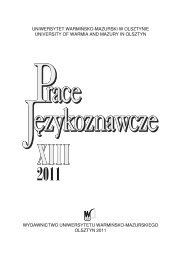
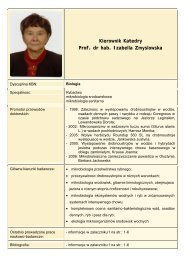
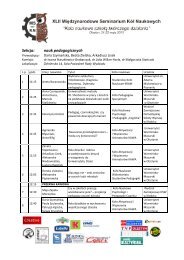
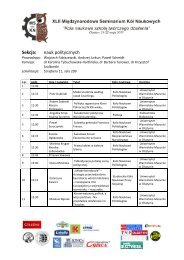

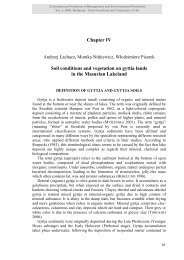
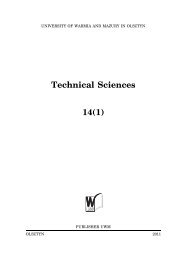

![wyklad 1 determinacja i dyferencjacja plci u ryb produkcja j [pdf]](https://img.yumpu.com/41397878/1/190x143/wyklad-1-determinacja-i-dyferencjacja-plci-u-ryb-produkcja-j-pdf.jpg?quality=85)
